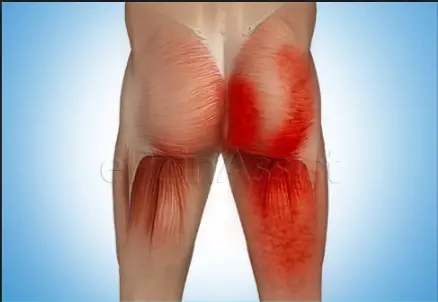Sore Buttock Muscles Causes: Curing your buttock pain starts with finding the cause
Buttock pain can be quite annoying when it occurs, usually because it’s not that common of a pain problem. However, because the pain is so infrequent, it’s important that you get a diagnosis from your doctor to determine the condition that’s causing your pain.
Buttock pain is an umbrella term for pain that results from a number of diseases, disorders, and conditions that affect the area of the human body that is often referred to as the “butt” or the “backside.” There are, of course, other more colorful names for buttock pain too.
Contents
Pain In Buttock Muscles Causes
The most common causes of buttock pain are:
Ankylosing Spondylitis
A kind of arthritis that causes inflammation of the spine. This is a chronic condition that has to be maintained for the rest of your life. There is no known cure for it, and treatment options only help you deal with the pain. It is a genetic condition that can be passed on to offspring. Eventually, the constant inflammation can result in the vertebrae fusing together.
Boils
Abscesses that form under the skin and can sometimes be quite painful. Boils that appear in the creases of the buttocks are known as pilonidal cysts. These usually start in the follicles of hair in the area from the pressure of sitting for extended periods of time. Nodules are likely to form, which can make it difficult to sit down.
Bone Cancer
Bone cancer is a very rare condition and can start in the bones themselves, or it can spread to the bones from other tissues and organs. The growths on the bones can affect the nerve roots, which may cause the pain.
Arthritis
Osteoarthritis is the wearing down of the joints from overuse and aging. This is a natural process that doctors have no known cure for; however, they can help you reduce, or even alleviate the pain. Rheumatoid arthritis is the swelling of the joints from the immune system attacking bodily tissues. Neither type of arthritis can be prevented; the best that can be done is to manage the pain.
Fibromyalgia
The symptoms of fibromyalgia include stiffness and pain in the body, without any signs of inflammation. There is no damage or deformity that occurs in the body, making it a difficult condition for doctors to diagnose. Arriving at such a diagnosis is usually done through the process of elimination.
Paget’s Disease
A chronic disease that affects the growth of the bones. The disease causes the bone to grow in an abnormal fashion, making it brittle and prone to breaking. What causes the disease is unknown, but there has been some genetic link for those who present symptoms. (Paget’s Disease)
Spinal Stenosis
The narrowing of the passageway where the spinal cord resides, caused by a tumor or a herniated disc; the condition puts pressure on the spinal cord, which results in pain, tingling, and numbness.
Sciatica
The sciatic nerve is a large nerve that runs from the base of the spine, through the buttocks, and all the way down the leg to the foot. Irritation of this nerve can be caused by standing and sitting for extended periods of time.
Shingles
is a flare-up of the herpes zoster virus, which is the virus responsible for chickenpox. The virus becomes dormant after chickenpox occurs in the body. Some people may contract shingles years later, while others may never have the virus show up again. There are contributing factors, however, such as emotional stress, cancer or an immunity deficiency, that contribute to the onset of shingles.
Pelvic Fracture
A serious injury can result in the fracture of the pelvic bone. This can make it very difficult to sit, stand or even move since the pelvic bone also includes the hip joint. Due to the location of the fracture and how many internal organs reside within that area of the body, it is common for the patient to experience internal bleeding.
To determine the cause of your buttock pain, consult with your physician. They can help narrow down the possibilities, and then recommend the best treatment for a cure. Your doctor will also monitor your treatment plan, and then adjust it according to your progress. Don’t let pain run your life for you; take control today for a pain-free tomorrow.
Pain In The Buttock Area Is No Laughing Matter
pain in the buttock area can be a symptom of a number of dangerous medical threats, many of which are not the least bit funny. Here’s a list of conditions which feature buttock pain as a symptom. This list is not all-inclusive, but rather covers the most common ailments that are likely to trigger medical versions of “pain in the backside.”
Various Cancers Sorry to start out with the scariest possibilities, but unfortunately, they’re among the most common. Colon cancer and rectal cancer are among the most common – and most dangerous – buttocks pain causes. Sadly, by the time this pain begins, the disease has usually progressed to a dangerous point. Cancer can also attach bones in the pelvis.
Constipation This one is so well known it scarcely needs to be mentioned. But it is a common cause of buttocks pain, especially if stool becomes impacted.
Pregnancy Bearing the additional weight of carrying a child can cause pain in the joints and muscles of the buttocks.
Sciatica or Sciatic Pain The sciatic nerve extends from the spinal cord into the lower back, through the buttocks and down the back of each leg to the ankle and foot. When this nerve is compressed or damaged in some way, it can cause buttocks pain along with discomfort elsewhere in the lower half of the body. Sciatica is often a problem for people who have to sit or drive for long periods as part of the job.
Arthritis Pain in the joints of the hip area caused by arthritis can be felt in the buttocks.
Bursitis There are also a number of forms of bursitis that can cause pain in the buttock area. Bursitis pain is caused by an inflammation of the fluid-filled sac known as a bursa, which is between a tendon and skin, or between a tendon and bone
Gluteal claudication Simply put, it’s pain that occurs when certain blood vessels in the buttock region don’t get a sufficient supply of blood. It’s usually because of an arterial obstruction.
Sacroiliitis This occurs when one or both of the sacroiliac joints, which connect the lower spine and pelvis, become inflamed. It can be caused by injury, pregnancy, arthritis, infection, or a number of other disorders and conditions.
Spondylarthropathies This term describes a collection of pain-causing problems that involve the attachments between your low back and the pelvis.
Osteoporosis This causes bones in the pelvic region become thinner, weaker and more brittle. This can trigger pain in the buttock in a number of ways.
Osteomalacia This is the softening of the bones due to defective bone mineralizations, usually caused by a vitamin D deficiency. Soft bones are more likely to bow and fracture. In children, this condition is called rickets.
Paget’s disease of bone This is a condition that causes bones to grow larger and weaker than normal. When the affected bones are in the buttock area, pain can be the result.
Piriformis syndrome This condition occurs when there a problem with the piriformis muscle, a muscle located deep inside buttocks under the gluteus maximus. Pain from piriformis syndrome can range from mild but annoying to severe and even debilitating.



